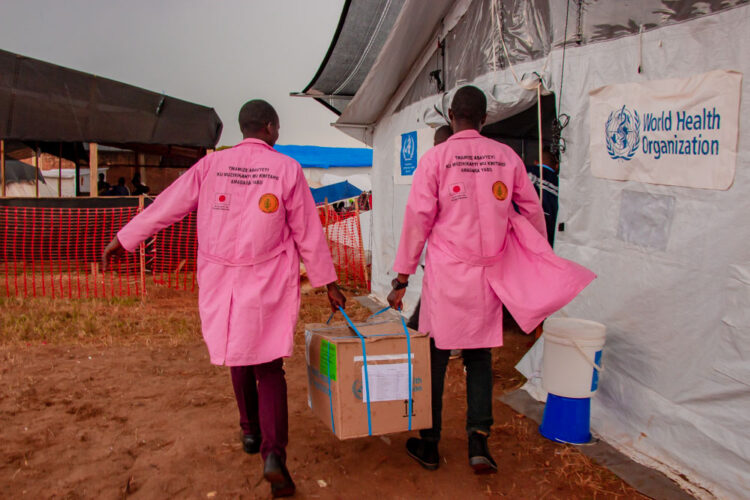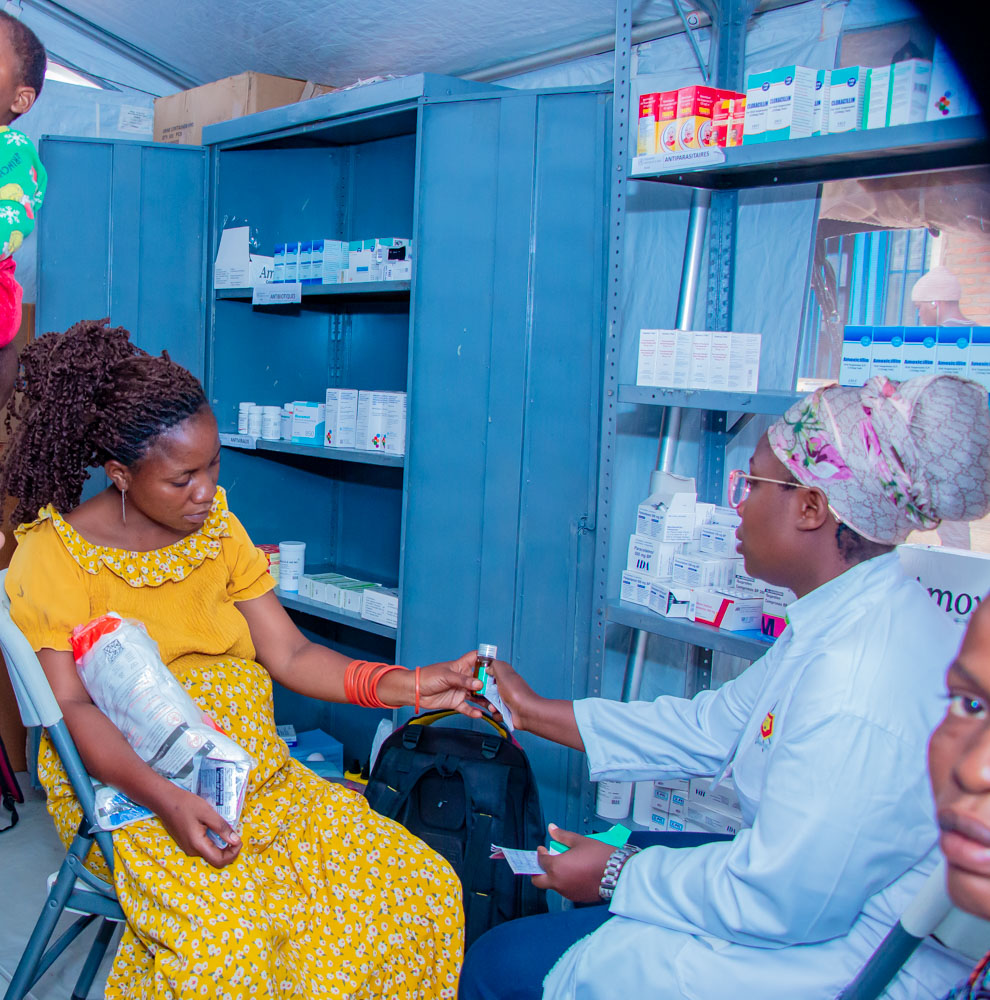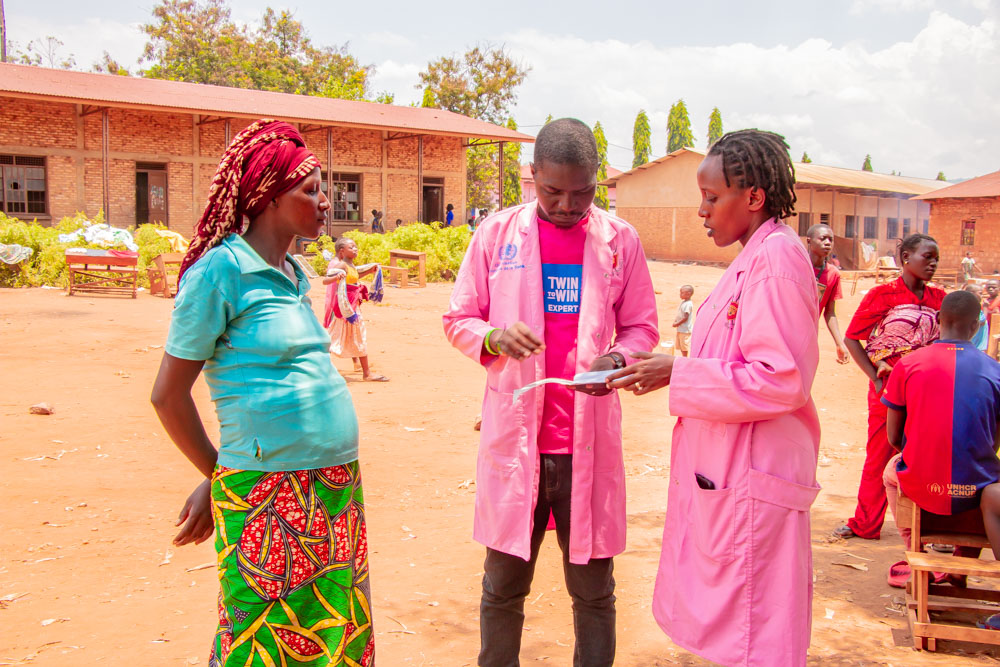Prioritising Women’s Health in Crisis: The Case for Midwives

By Augustin Harushimana
“When I arrived in Burundi, I was exhausted and emotionally shattered. I had fled Uvira to protect my children and my unborn baby after a terrifying night when men broke into my home. I didn’t know what to expect here or who to turn to. But from my very first antenatal visit with the midwives at the Cishemere site, I was welcomed with such warmth that I felt my heart grow lighter. I will never forget how I felt that day: for the first time in a long while, I had hope again.” -Faith*, Congolese refugee and mother-to-be
In February 2025, tens of thousands of Congolese families crossed the border into Burundi, fleeing renewed violence in the North and South Kivu provinces of the Democratic Republic of Congo (DRC). The Rugombo site in Cibitoke Province, just kilometres from the border, quickly became a critical reception point. By mid-March, it was hosting around 43,000 refugees, including 2,500 pregnant women and 7,000 unaccompanied children.
They arrived in search of safety, many with urgent needs for food, shelter, protection, and medical care. Midwives were there.
“The midwives didn’t just examine me – they listened to me and cared for me as if I were one of their own.” –Faith
Midwives as First Responders
 When humanitarian crises unfold, sexual and reproductive health needs don’t pause — they intensify. Women and girls are more likely to face complications in pregnancy, unsafe births, exposure to sexual violence, and a sharp decline in access to basic health services. In these moments, midwives are often the only trained professionals able to provide essential sexual, reproductive, maternal, newborn and adolescent health (SRMNAH) services.
When humanitarian crises unfold, sexual and reproductive health needs don’t pause — they intensify. Women and girls are more likely to face complications in pregnancy, unsafe births, exposure to sexual violence, and a sharp decline in access to basic health services. In these moments, midwives are often the only trained professionals able to provide essential sexual, reproductive, maternal, newborn and adolescent health (SRMNAH) services.
At the Rugombo and Gihungwe sites, midwives from The Midwife in Action’s Association (MAA Burundi) stepped up. With support from WHO Burundi and in close coordination with the Ministry of Health and UNHCR, they provided antenatal and postnatal care, safe delivery services, contraceptives, treatment for survivors of gender-based violence, and health education.
In just two weeks, the team delivered over 400 antenatal consultations, supported dozens of high-risk pregnancies, and reached more than 16,000 people with vital health information — all while working with minimal supplies and under tents that lacked privacy, equipment, and even basic medicines. Some midwives walked long distances each day to reach the site. Others managed complicated deliveries with no ultrasound or diagnostic tools.
“We do our best to provide quality care, but the lack of medications and tests is a major obstacle.” — Fabrice, midwife
“Every consultation is a victory. Today, I saw a woman in her eighth month who had never had a medical check-up.” — Parfait, midwife
A Global Pattern of Neglect
Burundi is not alone. The world is facing an unprecedented number of overlapping crises – from the refugee and hunger emergency in Sudan, to the violence in Haiti, the escalating conflict in the Middle East, and the continued displacement and instability in Myanmar.
According to the latest UN estimates, countries affected by conflict or considered “fragile” account for 61% of global maternal deaths, despite representing only 25% of global live births. Nearly 260,000 women died in 2023 from causes related to pregnancy and childbirth. Four countries alone – DRC, India, Nigeria, and Pakistan – account for 47% of all maternal deaths, and all are facing major humanitarian, economic, or health system challenges that increase maternal risk.
This is not a failure of knowledge or resources. It is a failure to prioritise the needs of women and gender diverse people during crises — and to include the health workers best placed to protect them.
The Difference Between Survival or Death
Midwives trained to the International Confederation of Midwives (ICM) global standards can provide up to 90% of essential SRMNAH services. In emergencies, they:
- Deliver antenatal and postnatal care
- Ensure safe births and manage complications
- Support breastfeeding initiation and continuation
- Provide care during pregnancy loss
- Offer contraceptives and safe abortion care
- Respond to gender-based violence
- Offer mental health and psychosocial support
- Raise awareness on disease prevention and reproductive rights
Their community ties and contextual knowledge make midwives the most adaptable health workers in emergencies. They are trained to deliver high-quality care as they are trained to provide care with minimal resources, working effectively with only the most basic tools and supplies. When supply chains fail or international responders are delayed, midwives are already there — ready to act and save lives.
“I had never had a pregnancy check-up before. The midwives gave me medicine and explained how to care for my baby. This gives me hope.”
– Amina*, Congolese refugee
“We provided a concrete response to the needs of refugee women. Our objective remains clear: zero preventable maternal or neonatal deaths. And we move forward with conviction.”
– Emelyne, midwife
Indispensable Yet Often Forgotten
 Sexual and reproductive health and rights (SRHR) are often an afterthought in the face of crisis. This marginalisation has direct consequences: midwives, who are essential to delivering SRHR, are frequently left out of emergency preparedness and response plans. Without their inclusion, critical services are delayed or overlooked entirely.
Sexual and reproductive health and rights (SRHR) are often an afterthought in the face of crisis. This marginalisation has direct consequences: midwives, who are essential to delivering SRHR, are frequently left out of emergency preparedness and response plans. Without their inclusion, critical services are delayed or overlooked entirely.
“Many women arrive in labour without any prior follow-up. We have managed several complicated deliveries under these very challenging conditions.” – Evelyn, Midwife
Then, those midwives who do get deployed often work in unsafe conditions, without fair pay, proper protection, or the supplies they need to provide safe, respectful care. In many cases, they also lack proper referral pathways, making it harder to ensure women with complications receive timely and appropriate care. Many are expected to deliver the impossible and they do but at enormous personal and professional cost, often working voluntarily or with little retribution.
“From the moment we arrived, we were struck by the distress of pregnant women. Some had never had access to prenatal care. Despite the lack of equipment, we do our best to ensure follow-up. But proper equipment would help us detect complications more effectively.” -Yvette, Midwife
A Global Call to Action
Women’s health and needs cannot remain an afterthought in global crisis response.
We call on governments, humanitarian actors, and donors to:
- Recognise SRMNAH as a core pillar of any humanitarian response — not a secondary concern.
- Include midwives in all stages of emergency preparedness, response, and recovery.
- Enable midwives by providing training, fair pay, safe working conditions, and the tools and supplies needed to do their job.
- Fund midwives’ associations to help coordinate care, advocate for community needs, and sustain services beyond the first wave of response.
The evidence is clear: when midwives are included, women are not forgotten. Their needs are met, their choices respected, and their lives saved. We must stop treating sexual and reproductive health as optional in crisis response. Midwives must be included, enabled, and supported — not only to respond, but to lead.
When midwives are supported, lives are saved and even in the most desperate circumstances, hope finds a way forward.
“Thanks to midwives, I no longer feel alone. I await my child with confidence.”
– Faith*
*Name changed to protect identity.